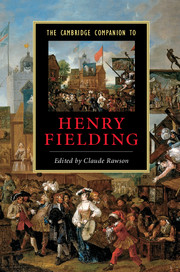Book contents
- Frontmatter
- Introduction
- 1 Henry Fielding’s life
- 2 Fielding’s theatrical career
- 3 Shamela
- 4 Joseph Andrews
- 5 Jonathan Wild
- 6 Tom Jones
- 7 Amelia
- 8 Fielding’s periodical journalism
- 9 Fielding and female authority
- 10 Fielding on society, crime, and the law
- 11 Fielding’s style
- 12 Fielding’s afterlife
- Guide to further reading
- Index
- Series List
8 - Fielding’s periodical journalism
Published online by Cambridge University Press: 28 July 2007
- Frontmatter
- Introduction
- 1 Henry Fielding’s life
- 2 Fielding’s theatrical career
- 3 Shamela
- 4 Joseph Andrews
- 5 Jonathan Wild
- 6 Tom Jones
- 7 Amelia
- 8 Fielding’s periodical journalism
- 9 Fielding and female authority
- 10 Fielding on society, crime, and the law
- 11 Fielding’s style
- 12 Fielding’s afterlife
- Guide to further reading
- Index
- Series List
Summary
Fielding’s writings are dotted with signs of his quest for fame and his insecurity about achieving it. Here he is, for example, in a typical moment: 'It is certain that a Man no where meets with such Opposition as in an Attempt to acquire Reputation by Writing, which the World always withholds from him as long as it is able, and seldom allows him till he is past the Enjoyment of it.' Yet despite this fear of being unrecognized at the court of Prince Posterity, he spent at least three and a half years of his life, off and on, in the ephemeral world of journalism, a genre rooted in the present day and responding to immediate events or interests. For much of the same time, of course, he was seeking the laurel as a novelist, hoping to create something of permanent value that would take him down the avenue of fame and perhaps also the path of wealth. In the prefatory chapter to Book XIII of Tom Jones, he invokes 'bright Love of Fame', who inspired Homer, Virgil, and Milton, to fill his 'ravished Fancy with the Hopes of charming Ages yet to come', but then calls on another Goddess, the 'much plumper Dame' of money, comfort, and solid pudding who presides over bad plays and serial publications. 'Keep back thy Inspiration', Fielding says to this fat deity, 'but hold forth thy tempting Rewards.'
Although Fielding does not cite newspapers among the Grub-street publications inspired by the Goddess of Gain rather than the Love of Fame, he might well have done so. Despite the fact that some of the most famous writers of the eighteenth century, with Addison and Steele as their exemplars, tried their hand at editing or writing periodical journalism (Swift, Pope, Fielding, Johnson, Goldsmith), it was still generally considered hackwork, its practitioners not worthy of citizenship in the Republic of Letters.
- Type
- Chapter
- Information
- The Cambridge Companion to Henry Fielding , pp. 109 - 121Publisher: Cambridge University PressPrint publication year: 2007

